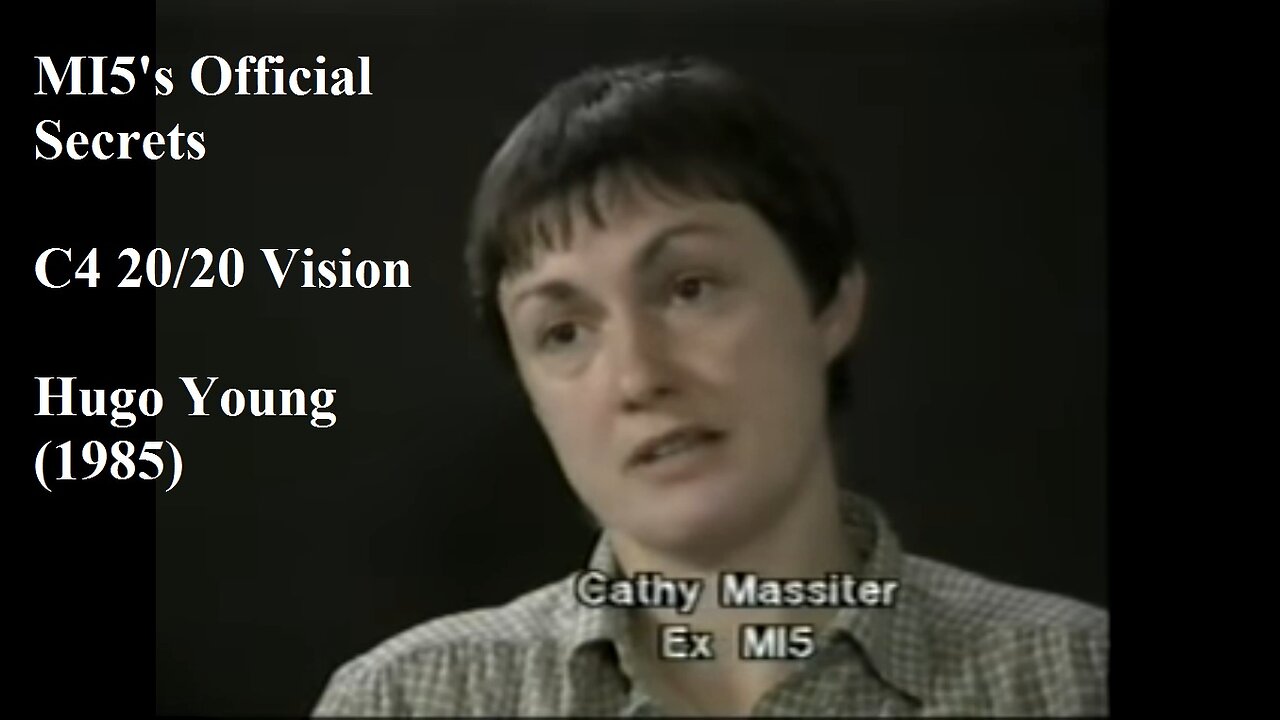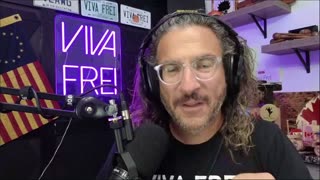Premium Only Content

MI5s Official Secrets Spying on CND 20/20 Vision C4 1985, Hugo Young, Cathy Massiter, Harriet Harman
20/20 Vision, MI5's Official Secrets (C4 1985), Hugo Young & Cathy Massiter
YouTube Views: 9,377
Published on Apr 23, 2011
MI5's Official Secrets is available as a DVD from the following
DVD 1985 60 Minutes
MI5' surveillance of CND, National Council for Civil Liberties and others.
http://www.concordmedia.org.uk/products/mi5s-official-secrets-1099/
The Massiter revelations
In March 1985, Cathy Massiter, an MI5 officer who left the service after 12 years, made disclosures to Channel 4's 20/20 Vision programme 'MI5's Official Secrets' that the telephone lines of the Campaign for Nuclear Disarmament (CND) and National Council for Civil Liberties (NCCL) had been tapped. The MI5 had classified these organizations as 'subversive', which in her opinion was being overzealous: "We were violating our own rules. It seemed to be getting out of control."
Cathy Massiter testified that she was required to compile a report based on her MI5 files for DS19, a special unit inside the Ministry of Defence set up during the tenure of Michael Haseltine. The MI5's coverage was so pervasive that at least four future ministers were 'on file'. For example this included Patricia Hewitt, then general secretary of the NCCL (1974 to 1983) and Harriet Harman (NCCL legal officer from 1978 to 1982). On the basis of Harman's marriage to Jack Dromey (who MI5 suspected of having pro-Communist views) and the fact that Hewitt was a friend of William Birtles (who was a friend, in turn, of D.N. Pritt, described by MI5 as a "staunch friend" of the Communist Party), both women were branded on the MI5 files as "Communist sympathisers."
Among other pressure groups targeted in the early 1980s was the Anti-Apartheid movement because the MI5 deemed it to be a front for a 'revolutionary communist group'. The Channel 4 programme also revealed that MI5's phone tappings included Mr Sid Harroway, shop steward convenor during the Ford strike at Dagenham in 1978 and a communist. Sir Robert Armstrong, the Cabinet Secretary, defended this action in 1986 by stating that "the Communist Party is still regarded in the United Kingdom as one of the organizations subversive of parliamentary democracy".
Harman and Hewitt successfully took their cases to the European Court of Human Rights, which ruled in 1990 that the files on them were in breach of Article 8 of the European Human Rights Convention which guarantees protection of private life.
Source
http://www.parliament.the-stationery-office.co.uk/pa/cm199798/cmhansrd/vo981102/debtext/81102-24.htm
http://news.bbc.co.uk/1/hi/programmes/true_spies/2336987.stm
http://www.salaam.co.uk/themeofthemonth/january03_index.php?l=5&sub=5
-
 LIVE
LIVE
Laura Loomer
2 hours agoEP118: LIVE COVERAGE: Trump Celebrates 100 Days In Office At Michigan Rally
1,950 watching -
 LIVE
LIVE
Barry Cunningham
9 hours agoWATCH TRUMP RALLY LIVE: PRESIDENT TRUMP MARKS 100 DAYS IN OFFICE WITH A RALLY IN MICHIGAN
1,434 watching -
 DVR
DVR
Badlands Media
8 hours agoBadlands Media Special Coverage: President Trump's 1st 100 Days Rally
20.9K2 -
 LIVE
LIVE
RalliedLIVE
4 hours ago $0.17 earnedWarzone All Night w/ Ral
72 watching -
 LIVE
LIVE
Sarah Westall
1 hour agoA Globalist Agenda or Chinese Payback? Fentanyl #1 Cause of Death for People Under 49
159 watching -
 LIVE
LIVE
LFA TV
22 hours ago| TRUMPET DAILY 4.29.25 7PM
132 watching -
 16:12
16:12
T-SPLY
8 hours agoJeff Bezos Is Now Enemy #1 For The Trump Administration
46.4K42 -
 7:27
7:27
China Uncensored
8 hours agoChina’s DISTURBING Expansion in Africa
8.78K8 -
 1:24:27
1:24:27
Redacted News
3 hours agoELECTION SHOCK! Canada Declares War on U.S. and Trump, India going to war with Pakistan? | Redacted
109K216 -
 1:18:53
1:18:53
vivafrei
6 hours agoCanada Elected a Globalist, WEF, 3-Passport-Carrying Manchurian Candidate! And Other News! Viva Frei
78.5K92